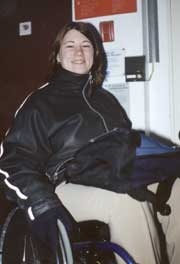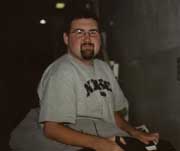
Teri-Lee Walters

André Faubert

Patrick Lefebvre
Photos by Christian
Johnson
|
by Christian Johnson
Teri-Lee Walters, a 27-year-old second-year human relations student at
Concordia University, hates getting caught between doors, alone, in an
undersized restroom, in her wheelchair.
“What makes it worse is that some restrooms have doors that do not
swing out. When you push them in and the space is too small for the wheelchair
to go through, you can be stuck there for quite a while, until someone
else comes to your rescue,” she said.
André Faubert, 19, who is in first year psychology, has been stuck
in his wheelchair on a lift situated between two sets of stairs in the
CC building on the Loyola campus. The first time, he had to be carried
by four construction workers who had to be summoned from their work on
the new science building. “Lately, the lift has been working very
well. In a matter of minutes, security is there to help,” he said.
Patrick Lefebvre, a 26-year-old student in his first year of journalism,
said that once, while waiting for an elevator with his mother at the Hall
building, she had to ask people to please make space so that he could
get in. “People looked at us strangely. Some got out to make space
for us. Others didn’t move.”
However, all three students are extremely happy with the environment at
the university, “They treat you really, really, really well,”
Lefebvre said. “I am surprised.”
Faubert acknowledged that from the first day of class he has been making
“tons of new friends. The university has even changed classrooms
to meet my mobility requirements.”
He has an inherited neurological condition that has caused a loss of strength
in his extremities such that he requires an electric wheelchair. He is
studying psychology full-time.
Lefebvre wants to become a TV journalist. “To be honest, I want to
go into sports broadcasting. I like sports, and since I can’t play
any sports, I think I can talk about it. I am not going to lie to you,
I want to work on TV because I want to make lots of money. It’s highly
competitive. I know because I have many friends in the media.”
Teri-Lee, who suffered a sports-related accident when she was 13 years
old, said, “I came to Concordia because I wanted to work with people.”
She is now involved in organizing an association for disabled students
at Concordia. “Students here need a voice — to organize and
hold events, to help change attitudes — an association open to anyone,
with or without disabilities, learning from each other.” The association
has just been accredited by the CSU.
Increasing numbers of people with disabilities are choosing to pursue
their studies. They cherish their independence and wish to develop their
full potential as human beings. Leo Bissonnette, Coordinator for the Office
for Disabled Students, said, “More and more, people with disabilities
are successfully being integrated from lower levels of education, right
up to the university level.”
Bissonnette said, “More than 10,000 students go through the Hall
Building daily. Escalators don’t always work, lighting has to be
improved in many areas, elevators are deficient, [but] attitudes and standards
are changing over time.”
He believes that the new buildings under construction will reflect great
improvements. From the first stages of the design, there has been extensive
consultation among the people who will be using them, including a checklist
that covers everything from doorknobs to illumination, and from the laboratory
facilities to the size and access to elevators. “We have learned
a lot in the past 15 years, and we are putting it into practice.”
Bissonette added that the Concordia Office for Disabled Students is highly
efficient within a national context. The Office for Disabled Students,
created in 1980, is a student-centered facility that offers a range of
academic and support services for students with special requirements.
This year, there are 574 students with disabilities. Of those, 278 suffer
from learning disabilities, 57 have limited mobility, 40 are visually
impaired, 36 have hearing impairments and 118 have other health limitations.
Teri-Lee Walters has a list of goals. She’d like to see “more
accessible restrooms to avoid embarrassing situations; larger elevators
so that you don’t have to run over other peoples’ toes with
your wheelchair; improved attitudes among teachers and other students;
eliminating overcrowded classrooms where students with wheelchairs become
safety hazards because they are forced to occupy the entrance; and making
sure that all main accesses to the buildings have door-opening buttons
that are in working order.”
For Lefebvre, who has cerebral palsy and lives on the South Shore, coming
to class requires great effort. He can’t take the métro, and
the adapted transport for disabled people does not go over the bridges
to his neighbourhood, so he has to take a taxi, which costs $100 per day.
The government of Quebec reimburses these costs only for attending classes,
doctor’s appointments or going to work. If he needs to go to the
library or take part in extra curricular activities, he must pay for his
transportation himself, and at those rates, it can become impossible.
Attitudes are a major issue for the mobility-impaired. Patrick has some
sad memories from his high school days. “When I came to dating age,
some classmates made fun at me. People didn’t think I could have
a girlfriend, and it hurt sometimes. I like girls, and I want to be taken
seriously when it comes to the opposite sex.”
Leo Bissonnette agreed. “In reality, people are fixed on their own
agendas — me first, you later. Individual experience, such as having
a disabled person in the family, determines generosity. Our office is
continuously working to sensitize students and faculty about people with
disabilities.”
In a community environment, such as at Concordia, shared concern is an
ideal. “We want to be treated equally,” Walters said. “Times
have changed. We have rights. Positive attitudes reinforce positive actions,
and communication is a two-way street.”
We are all an accident or an illness away from potential disability, and
many of us will become disabled. Walters jokingly said, “People with
limited mobility refer to people without mobility impairment as TABs,
or Temporarily Abled Bodies.”
|
|
|



